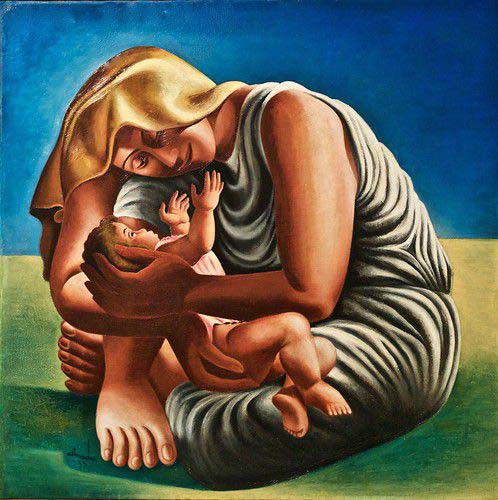The Mother Child Bond, and Why It Matters SO Much

We’ve just celebrated Mother’s Day. This holiday affects people differently, but certainly leads us to reflect on the vitally important mother child bond.

You might think that Mother’s Day is a manufactured holiday, or you might feel that it’s a highly meaningful family event. Either way, there’s no question that it invites us to think about the crucial mother child bond — and what it means for the whole of human life.
This is not just important for children! The mother — archetypal mother — has huge symbolic significance for us through out the whole of our life journey.
The mother child bond is unquestionably the single most impactful relationship that a human will have in the course of a life. That impact may be positive or negative in any of quite a number of ways. What is certain is that we will experience its influence, both consciously and unconsciously throughout the life journey.
At Home in the World — Or Not?
We humans are born very dependent on our parents — especially our mothers. Compared to a lot of other species, a lot of our developing occurs after we leave the womb, especially in the first early years. As Prof. Robert Winston of Imperial College, London emphasizes, neuroscience, psychology and epigenetics all stress that a tremendous amount of our happiness and future mental health depends on the interaction between mother and child. We experience the impact of the mother child bond far into our adult lives.
The ground-breaking psychiatrist John Bowlby first developed the idea that a strong emotional and physical attachment to a primary caregiver is critical to our personal development, and this is a cornerstone of psychology today. However, years before, in 1927, Jung wrote that
The mother-child relationship is certainly the deepest and most poignant one we know… it is the absolute experience of our species [italics mine], an organic truth…
C.G. Jung, Collected Works, Volume 8
The mother-child bond, or lack of it, influences our ability to relate to others. Even more, it impacts the whole of our ability to relate to, and to trust, life and the world. This is true in infancy, youth and all through adulthood.
Running From — Or To — Mother
Jung emphasized that facing the reality of our experience of mother is essential if we’re to be able to journey toward wholeness as individuals. Whether experiences of “good mother” or of “bad mother” predominate in our lives, if we don’t look at or explore our experiences of mother, they can have a profound effect on our relationships — and the whole of our lives. As Jungian analyst Andrew Samuels puts it:
…if bad experiences predominate over good in infancy, then the “bad mother” pole of the range of expectations is activated, and there is no counterbalance.
Samuels, Andrew, et al., Critical Dictionary of Jungian Analysis
So, what might this look like? Such an individual might struggle with lack of trust in life, and especially trust in relationships. characterized by pessimism and a lack of trust in life in general, and perhaps of his or her own abilities in particular. There might well be a tendency for the individual to struggle with chronic depression and anxiety.
Well, does that mean that the person who has a purely positive experience of mother will be set up for smooth sailing through the ocean of life? Actually, according to Samuels, and to Jung, it does not. As Samuels tells us,
…an idealized image of the mother-infant [and, we might add, mother-child] relationship can lead to only the ‘good” end of the spectrum being experienced, and the individual will never come to terms with the disappointments and realities of life.
Samuels, Andrew, et al., Critical Dictionary of Jungian Analysis
So, such an individual, who has only experienced the positive side of mothering, may go through life with a kind of a “glass jaw”, as boxers would say. They may be particularly unable to “take it on the chin” when things get difficult in life, and may not be able to deal with the challenges that require accepting that what life dishes out is not always fair or easy. Such people may experience particular difficulty in dealing with major life transitions such as divorce, loss of a loved one, career setbacks, and other similar life challenges
“Good Enough” Mother Energy
As preeminent psychoanalyst D.W. Winnicott stressed decades ago, what we actually need to enable us to cope with life is a mother child bond that is not perfect — but that is, as he put it, “good enough”. Such a bond would include positive experiences of “good mother”, but also experiences where the mother cannot save us from all hurt or difficulty, where we have to gradually develop our capacity to look after ourselves in the world.
There are a great many people who have genuine gaps in their experience of mother in their families of origin. (I would certainly include myself in that number.) Often, working with a supportive and empathetic /a-midlife-transition can allow us to re-visit our experience of mother in ways that bring greater self-understanding, self-compassion and resilience.
